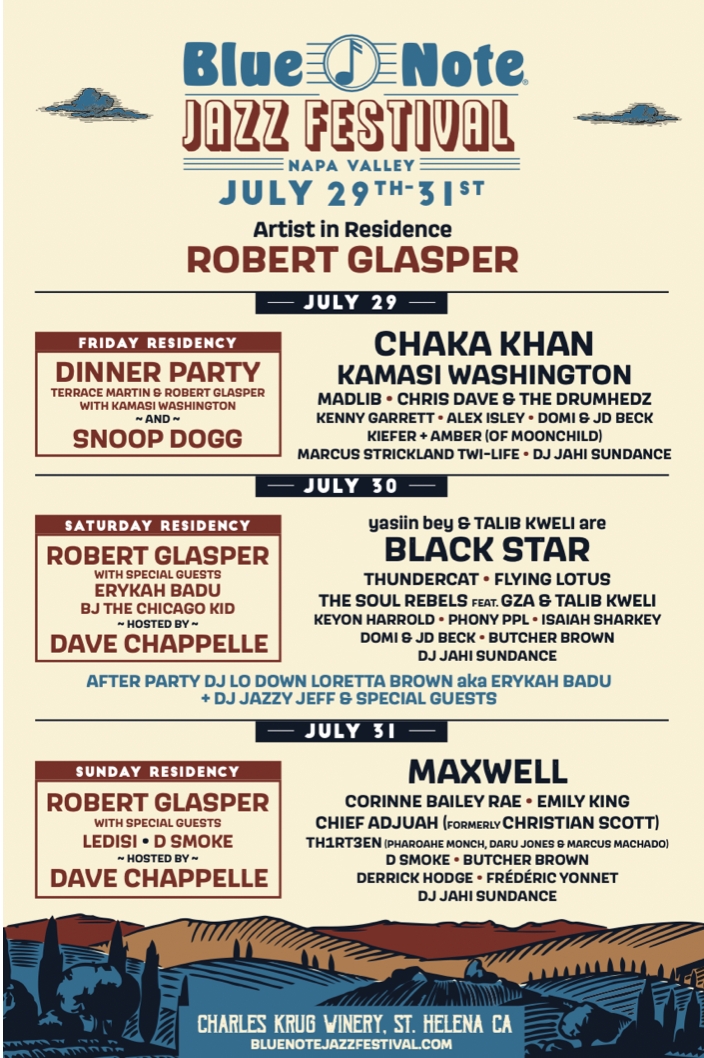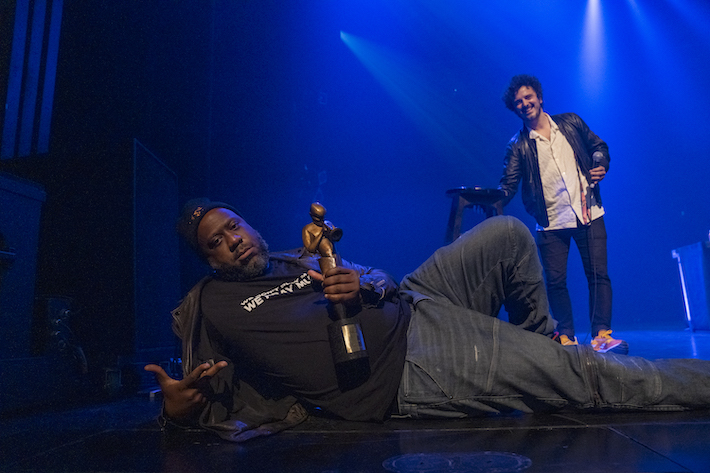Robert Glasper is doing it all these days. He’s just come off a European Tour in support of his latest album, Black Radio III, performed at the Montreal Jazz Festival earlier this month (where he received the prestigious Miles Davis Award), and is in the midst of scoring not one, but three TV and film projects. But the biggest and most personal undertaking of them all for the four-time Grammy Award-winning pianist, producer, and composer, is the inaugural Blue Note Jazz Festival in Napa, CA.
Going down at the Charles Krug Winery from July 29th – 31st, Glasper is the festival’s artist in residence and curator. The lineup is an eclectic representation of jazz, hip-hop, and R&B’s inextricable ties. Where Chaka Khan, Maxwell, and Black Star are playing rare headlining sets, the lineup is as eye-popping for the creative collaboration performances like Snoop Dogg with Dinner Party (Glasper, Kamasi Washington, and Terrace Martin), The Soul Rebels with GZA & Talib Kweli, and Glasper alongside Erykah Badu, BJ The Chicago Kid, Ledisi and D Smoke — oh, and Dave Chappelle is also the weekend’s host.
We caught up with Glasper by phone to talk about the vision behind the festival, how the legacy of Miles Davis has inspired him, and how his career sees him tracing the evolution of Black music in incredible ways.
This interview has been lightly edited for length and clarity.
AS: You just got back from Europe and I saw you first tour stop at Montreal Jazz Festival a couple weeks ago. Considering your work on the Everything’s Beautiful tribute album of sorts to Miles Davis, and scoring Miles Ahead, what was it like be honored with the Miles Davis Award as someone pushing jazz music forward into new realms the way Miles did?
It’s so funny how Miles Davis pops up in my life. Miles Davis is the first jazz musician that I ever heard cover pop songs. I was in junior high school and I got that record Miles Around The World where he covered Michael Jackson’s “Human Nature” and he also covered Cyndi Lauper’s “Time After Time.” That opened my eyes a lot. It’s part of the thread of who I am in just being open and being modern and not forgetting the history, but not being held back by the history. And then you fast forward and Don Cheadle asked me to score the Miles Davis movie he did, Miles Ahead, and that was the first thing I ever scored. Then in the middle of scoring that, Sony hits me and asks me to produce a record on Miles Davis because it was going to be his 90th birthday. So they asked me to do this remix record and I told them that I would love to, but I explained to them how I wanted to do it: It can’t just be that I put some hip-hop drums under a muted trumpet and call it a day. I wanted to really dive in. That’s why it’s [Everything’s Beautiful] also one of my favorite projects too, cause the way I did it, and the way I captured more of Miles than just his trumpet. I think he’s on two songs on the whole album as far as the trumpet goes. ‘Cause the other stuff, I literally have his breath tied in with the bass drum on a song, I have him talking, clapping, whistling. I’m trying to get the elements of the whole person. You can’t narrow him down to just the trumpet. So me getting that award, it just fell into place that with Miles, he is who he is, but he’s the reason that jazz started being so open to begin with. He’s a trailblazer.
He’s always looked to blur the definition of jazz, which is kind of what you’re pushing forward now.
Exactly, it was such an honor and I’ve been playing Montreal Jazz Festival for years, so it was an honor to get that. It was also the heaviest award I’ve ever gotten [laughs] I might’ve gotten knocked over by the trophy, it’s so heavy.
Oh yeah, I saw that thing, it was like as big as your torso!
And since that was the first day of my tour, I was gone for three weeks, so I had to have them mail it to me.
Well speaking of festivals, you’ve got Blue Note Jazz Festival in Napa coming up. I think it really speaks to so much amazing collaboration between jazz and hip-hop and R&B artists. What’s been the vision behind the way you guys curated this and brought everything together?
The idea literally came from my residency at the Blue Note [in New York] every October. I’ve done it three times so far and this last October, Steve [Bensusan] and Alex [Kurland] from Blue Note, the owner and the booker, came to me and started talking about doing something outside of the residency, maybe doing a festival. They approached me and I was like, “That makes all the sense in the world.” We kept talking about it here and there and then literally this past April, we pulled the trigger on it and said, “Let’s actually do it and make it happen.” The festival is cool cause it feels like a family reunion. Everyone performing at the fest, I know them. I kinda got to handpick my own f*cking festival. It doesn’t get better than that. They’re all amazing artists and I got to handpick them and put them all together. That’s not a typical thing that an artist or musician gets to do.
Yeah, and for the more high-profile collab sets like Dinner Party and Snoop, there’s also one like Amber from Moonchild and Kiefer. Like, where the hell else can I see that?
Yeah, Amber’s my homie cause she was on my R+R=Now record. We’re all friends. And really, it’s like a pick-up game. Like when Michael Jordan did Space Jam and he got to invite all his NBA basketball player friends to play pick-up games with him while he was recording the movie. This is like my Space Jam [laughs]
It definitely feels like a version of your residency on steroids.
For sure. That’s literally where the idea burst from. We even got going with some guests that we’d had on the residency before and some that we wanted to have. I think it started with me making a list of people that I wanted at my next residency and then was like, “We should do a festival and have all these people.”
Something that struck me in Montreal and now looking at the lineup of this festival, and then looking at Black Radio — Black Radio III specifically — is that you’re really trying to tell the story of the evolution of Black music and where everything is at now. Talk a little about that and how everything is connected with the artists you’ve got playing at this festival that has your name at the very top.
A lot of people have put jazz in this box of exclusivity. Where it’s this exclusive thing that doesn’t f*ck with anybody else, any other genres. And that’s just not the case. In its conception, it’s already amuck. Jazz is mixed with classical music, blues, gospel… And later on, when you listen to certain jazz standards, they weren’t even standards, they were show tunes. They were songs people got from musicals. Like “My Favorite Things” or “All The Things You Are,” these important jazz standards, these weren’t jazz tunes. These were jazz artists reaching out into the world and bringing worldly things into the music and then they became standards. That’s kind of where I come from it. Black music is a big house and it has many genres under that roof, blues, gospel, jazz, hip-hop, R&B, you name it. I like to go room to room in this big house of Black music. Like I have a key to it all, because it’s in my DNA. I studied this music, I went on tours with some of the greatest in each genre, so I feel like I’m one of the people that can represent this thing that we call Black music. There are so many amazing artists and trailblazers, and to have them all in one festival represents so much and represents how free the music can be.
I’m hard-pressed to think if I’ve ever seen a festival lineup quite like this. What’s your hope for this weekend?
I’m hoping that this turns into an annual thing. But also, with the kinds of musicians and artists that we have, it lends itself to probably a lot of things we’ve never seen before. People sitting in with other people, cross-pollination on the stage. Most of the time on the festival stage, you go see that one artist and that’s what you see, thats what the festival is. But this one’s gonna be more cross-pollination, with a family-oriented kind of vibe. It’s smaller than most festivals on purpose. We’re trying to mirror the Blue Note residency so we wanted to keep it intimate (in festival terms) and try to mimic that feeling that you get when you’re in a small club; like the residency, with unexpected pop-up guests. I’m getting all kinds of calls from all kinds of artists on it. I’m really looking forward to it.


